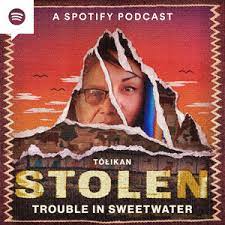
- Details
- By Jenna Kunze
Pulitzer Prize and Peabody Award-winning Indigenous podcast Stolen is back for a third season. Titled Trouble in Sweetwater, this season takes listeners to the Navajo Nation to investigate the cases of two missing women, which expands to a larger story about the search for justice in a place where interviewees say you can get away with murder.
Sweetwater, Arizona, is a remote corner within the Navajo Nation’s 27,000-square-miles reservation where tribal police officers number in the 200s.
In October 2022, podcast host Connie Walker, a tribal citizen of the Okanese First Nation in Saskatchewan, began investigating the missing person report of Ella Mae Begay, a 62- year-old Navajo woman who was reported missing by her daughter a year and a half earlier. In the early morning of June 15, 2021, Ella Mae’s daughter called police to report that a man had broken into her own home and stolen some drinks before wandering off. Before police could show up, she heard her mother’s truck startup next door, and drive off. Ella Mae was never seen again.
In Indian Country, where disproportionately high levels of missing and murdered Indigenous women and girls constitute a crisis, Begay’s case stands out for the national attention it received. That’s in part credited to her niece, Seraphine Warren, who walked over 2,000 miles from the Navajo Nation to Washington, D.C. to raise awareness about her missing aunt.
“I've reported on missing and murdered Indigenous people for years and Ella Mae has gotten the level of attention I almost never see,” Walker, who spent nearly two decades as a reporter and host for the Canadian Broadcasting Corporation in Toronto, says in Episode 1, previewed by Native News Online. “The first time I saw her missing persons poster, I was immediately drawn in because of her age, her implicit vulnerability. I look at her and see the elders in my life who live alone in our communities. The thought of someone coming to their door in the middle of the night shook me.”
Ella Mae’s case remains unsolved more nearly three years later, despite a suspect—23-year-old Preston Tolth—allegedly telling police that he was with Ella Mae the night she went missing. Tolth told investigators that he "snapped" and hit Begay in the face four times before leaving her on the side of the road, “probably dead,” Walker reports.
“I came here hoping to find out what happened to Ella May Begay,” Walker says in episode 1. “But now I also want to know: what's happened with her case. Why did it take police so long to respond the night Ella Mae went missing? And why is her disappearance still unsolved with everything that Preston told investigators?”
Stolen’s season three comes on the heels of the series’ award-winning second season, Stolen: Surviving St. Michael’s, where Walker investigates her own family’s history of abuse—and intergenerational trauma—at an Indian Residential School in Canada. Walker and her team exposed systemic abuse that permeated the St. Michael’s Indian Residential School in Duck Lake, Saskatchewan for decades and preserved the testimonies of St. Michael’s survivors through a modern-day oral history project. Over the course of ten months of reporting, the “Stolen” team uncovered more than 200 allegations of sexual abuse against priests, nuns, and staff members.
The series was awarded the 2023 Pulitzer Prize in the Audio Reporting category as well as a 2023 Peabody Award in the Podcast and Radio category. In Season 1: The Search For Jermain, Walker investigated an unsolved missing person’s report for Jermain Charlo, a young Indigenous mother who went missing in Missoula, Montana in 2018.
New episodes of Stolen: Trouble in Sweetwater will air exclusively on Spotify every Tuesday.
More Stories Like This
Watermark Art Center to Host “Minwaajimowinan — Good Stories” ExhibitionMuseums Alaska Awards More Than $200,000 to 12 Cultural Organizations Statewide
Zuni Youth Enrichment Project Takes Top Emerging Artist Apprentices to Phoenix for Artistic Exploration and Cultural Immersion
From Dishwasher to Award-Winning Chef: Laguna Pueblo's Josh Aragon Serves Up Albuquerque's Best Green Chile Stew
Rob Reiner's Final Work as Producer Appears to Address MMIP Crisis
Help us defend tribal sovereignty.
At Native News Online, our mission is rooted in telling the stories that strengthen sovereignty and uplift Indigenous voices — not just at year’s end, but every single day.
Because of your generosity last year, we were able to keep our reporters on the ground in tribal communities, at national gatherings and in the halls of Congress — covering the issues that matter most to Indian Country: sovereignty, culture, education, health and economic opportunity.
That support sustained us through a tough year in 2025. Now, as we look to the year ahead, we need your help right now to ensure warrior journalism remains strong — reporting that defends tribal sovereignty, amplifies Native truth, and holds power accountable.
 The stakes couldn't be higher. Your support keeps Native voices heard, Native stories told and Native sovereignty defended.
The stakes couldn't be higher. Your support keeps Native voices heard, Native stories told and Native sovereignty defended.
Stand with Warrior Journalism today.
Levi Rickert (Potawatomi), Editor & Publisher

